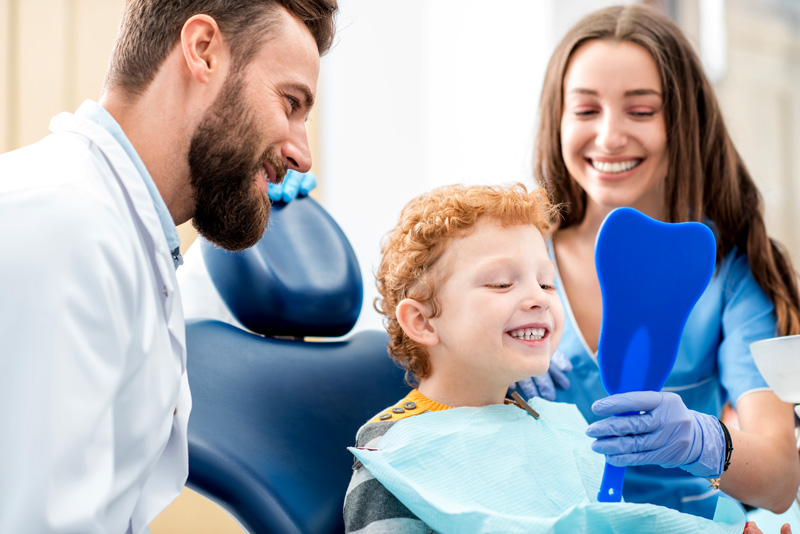Dental visits can be difficult, if not impossible, for children and teens with autism and developmental disabilities. These challenges can preclude important preventative care that impacts underlying health issues. In these situations, dental care also becomes a quality-of-life issue – not only being able to get children the dental care they need but doing so in a context in which they are comfortable.

There are oral health disparities among children with autism as the characteristics of the disorder may prevent individuals from successfully tolerating oral examinations and procedures. The dental office is an unfamiliar setting, with noises, smells, and contact that can be frightening or uncomfortable. Children with autism may struggle to sit still throughout the exam or cooperate with elements of the exam and treatment. Further, there may be few local providers that are accustomed to meeting the needs of individuals on the spectrum. Travel to such specialized sites may be challenging for those students and resource intensive for parent or provider.
How can schools and dental providers remove barriers to care for children with autism? This article will present a blueprint for dental service desensitization for children with autism and show how special education schools can partner with dentists to build in-house clinics.
Dental Desensitization Program
According to joint research from the Department of Pediatric Dentistry at Franciscan Children’s in Brighton, MA and The New England Center for Children, desensitization programs tailored to the needs of children with severe autism help them overcome disruptive behavior.1 Further research from The New England Center for Children suggests that more frequent practice and exposure to the dental context can improve outcomes.2
According to research from the University of Washington Center for Pediatric Dentistry, dental desensitization is key to successful dental care.3 Factors that predicted a successful dental examination included an ability to be involved in group activities, ability to communicate (verbally or non-verbally), and understanding key dental terms and procedures.
Special education schools can empower their teachers and students with a dental desensitization program tailored to the needs of the individual students. The typical program includes initial assessment, a dental skills curriculum, and an in-school mock dental suite.
Initial Assessment – The program begins with an initial evaluation to identify dental health and any behavioral issues related to the dental experience. Staff may also survey parents and providers for further information regarding previous dental visit outcomes. The goal of the assessment is to determine whether the behavioral issues are specific to the dental context and what elements of a dental exam can and cannot be successfully completed by the individual.
Dental Skill Curriculum – A life-skill curriculum of dental hygiene and dental office practice may include teaching oral hygiene fundamentals such as brushing, flossing, swishing of mouthwash, and eating a mouth-healthy diet. The curriculum should break down each individual task into smaller components, which can be introduced in a graduated fashion as the individuals’ tolerance and cooperation improves. Some approaches contextualize the dental process as a story with students shown pictures or videos of the equipment and step-by-step directions on what will happen.
Development of a dental skill curriculum may benefit from partnership with a dentist. In the case of the New England Center for Children, they partnered with Smigel Supersmile® Dental for curriculum advice and procurement of a dental chair and instruments for an in-school mock dental suite.
In-School Mock Dental Suite – An in-house mock dental suite with chair and dental tools can acclimate and desensitize children with autism to the dental experience. Bright lights, new smells, and moving chairs can be unnerving to children with autism.
The dental process can be broken into multiple steps that are then introduced in a graduated fashion, moving through the process as each step is successful. The protocol can include walking into the room, sitting in the chair, bib application, bite blocker application, visual inspection of teeth, mock scaling, cleaning with toothbrush, flossing, mock fluoride application and dental clinic probes. For children with autism, achieving success and comfort with each step often requires dozens of sessions over three to six months.
Children who are comfortable with the dental exam process receive twice-a-year oral care from qualified pediatric dentists in a school’s area. Such care would include cleanings, cavity fillings, orthodontics, and oral surgery.
In-House Dental Clinic: From Desensitization to Actual Dental Care
The ideal scenario offering the most comfort to children (and thus the greatest chance for dental success) is a true in-house dental clinic at the school. The benefit of having the dental clinic on-site is that students can practice their dental desensitization in the actual dental clinic, which should increase the likelihood of any gains made during desensitization translating to the actual dental exam. The expectation is that students will be more comfortable and prepared for their check-ups and able to tolerate the experience with far less disruption to their daily routine and most importantly, the anxiety that comes with a trip to the dentist.
How does a special education school go about creating an in-house dental clinic? There are three stages to consider: 1) Partnership with a local dentist group; 2) Design and construction; 3) Operations.
Stage One: Partnership with Local Dentist Group – In partnership with a dental clinic, a school can take dental desensitization and care to the next level. The in-school clinic will have dental services provided by the partner dentist, offering the full breadth of dental services and state-of-the-art technology for enhanced care without the student having to leave the school.
In the case of The New England Center for Children, the school partnered with New England Dental Group. Dental groups may welcome the opportunity to partner with a special education school. Dentists are able to deeply impact the lives of children and by extension their families. It demonstrates a deep commitment to giving back and making a tangible impact in the community.
In order to execute an initiative as complex as a fully-functional, on-site dental clinic, a school should align with a dental group that meets certain criteria: ability to provide expertise in the area of dental suite construction, willingness to provide clinicians to perform exams and check-ups and to thoroughly train them to work with an autistic population, ability to provide more in-depth services, such as sedation, and a strong reputation in the community.
Stage Two: Design and Construction – An important step in determining the feasibility of operating a clinic in one’s school is to bring in experts in the specialty field of dental office construction. They will examine the proposed space and determine electrical, plumbing, and equipment needs. From this will be produced a detailed renderings of a one-or-two-chair clinic and estimated costs for construction and equipment.
Once the costs and schematics are approved, the construction dates can be set. As part of this process, your school’s nursing staff should work closely with the dental clinicians to ensure that they are fully trained and comfortable working with your students.
Stage Three: Operations – Your partner dental group will provide the hygienists and doctors to work in the clinic. A likely schedule would be two days per week, which may grow with demand. Visits would be general exams and cleanings; should more in-depth procedures be required, students could receive care at the dentist’s “home” clinic. The school’s desensitization program can be performed in the actual clinic in which students real exams and cleanings will be held.
From our experience at The New England Center for Children, feedback from parents has been overwhelmingly positive. A heavy burden is placed on staff and parents around scheduling off-site dental exams, obtaining consents, verifying insurance, and on teaching staff who are responsible for transporting their students to and from the dentist. The in-house clinic and professional dentist staff alleviate these and other time-consuming administrative processes which benefits everyone.
An in-house dental clinic will likely require donor support in addition to a partnership with a dental group. A dental desensitization program and clinic can set your school apart and will garner positive response from staff, parents, and donors. Good dental health equals good general health. Anyone who has worked with special needs students knows that having dental services on-site is a game-changer for kids, teachers, and parents.
Jessica Sassi, PhD, BCBA-D, LABA, is CEO of The New England Center for Children, a nonprofit research and education center dedicated to transforming the lives of children with autism worldwide since 1975.
Footnotes
1. “Functional Analysis and Generalized Treatment of Disruptive Behavior During Dental Exams,” Journal of Applied Behavior Analysis, Sept., 2020. https://pubmed.ncbi.nlm.nih.gov/32720340/
2. “Effects of Decreasing Intersession Interval Duration on Graduated Exposure Treatment During Simulated Routine Dental Care,”Journal of Applied Behavior Analysis, Sept. 29, 2019. https://doi.org/10.1002/jaba.642
3. “Desensitization Training Improves Dental Visits for Children with Autism,” Dentistry Today, July 14, 2017. www.dentistrytoday.com/desensitization-training-improves-dental-visits-for-children-with-autism/




